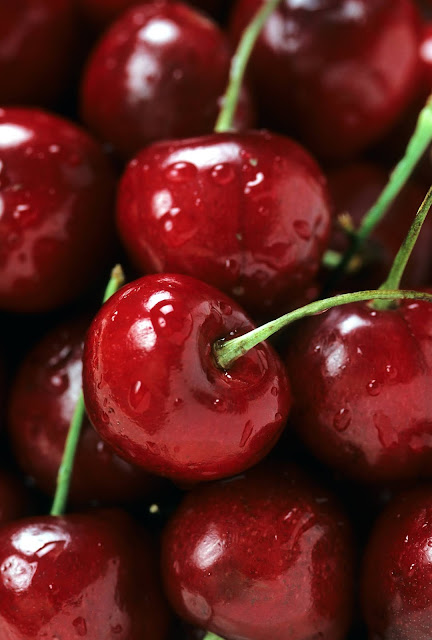In many parts of the world, cherry is the most popular fruit of its kind, with a delicious taste that is hard to resist. You may wonder what particular health benefits it offers, but cherries are celebrated as one of our healthiest fruits, and indeed they are one of the healthier foods overall. They behave similarly to other fruits such as apples, oranges, grapes or even bananas, although they are not as sweet or sweet.
A single cup of fruit (20 cherries) has a recommended daily intake of 1.5 grams of protein, 2.2 grams of fat and 1 gram of carbohydrates. One cup of cherry contains 1,000 mg of fibre, which is about a third of your daily recommended calorie intake.
If you get into the habit of snacking on tart cherries, you can improve your brain in several ways, according to a new study by researchers at the University of California, Berkeley.
The fruit's powerful antioxidants, anthocyanins, provide red colour and many important health benefits, including a reduction in risk factors for heart disease. Studies have shown that cherries can even reduce the symptoms of Alzheimer's disease and Huntington's disease. There is growing evidence of the benefits of cherry as a healthy food for the brain and heart. The heart health benefits are related to reducing inflammation, total cholesterol and abdominal fat, according to the American Heart Association.
With more than 80 million Americans suffering from some form of heart disease, red fruit and vegetable consumption is more important than ever, according to the American Heart Association.
According to researchers, flavonoids found in cherries, which have cancer-inhibiting properties, known as quercetins, can prevent heart disease. Although cherry has many other health benefits, such as its antioxidant properties, research has shown that cherry consumption can not only help the body prevent heart disease and cancer, but also provide pain relief and improved bone health. All these health benefits are possible because of the antioxidants contained in the cherry, the main antioxidants being antioxidants.
Dried cherries are considered a nutritionally important source of quercetins, as they contain more than 1,000 times more of them than the average fruit. In addition, cherry contains a large amount of flavonoids, such as flavanoids and flavonoacids, and the fruit contains a high concentration of antioxidants, particularly in its fruit juice.
Although cherries are a common risk factor for cardiovascular disease, they are an essential part of the diet. A cherry diet has been shown to help reduce swelling and inflammation, as well as prevent heart disease and strokes.
Cherry is generally low in fat, but there is evidence that even on a high-fat diet it can actually help prevent weight gain. Cherry also has a high water content, so increasing water consumption will improve metabolic processes and certainly increase energy content.
The Alzheimer's Association counts cherry among the foods that boost health and it is high in antioxidants. Its dark red colour, for example, is due to its high content of anthocyanins, an antioxidant, as well as its antioxidant content.
Cherry also contains 3 grams of fiber, which helps regulate heart rate and blood pressure and keep you full for longer. A cup of cherry has the same amount of potassium as a banana, which makes it a great substitute if you're not into a Ho-Hum banana. Many people automatically reach for bananas because they are filled with potassium, but a cup of cherry has less than 100 calories.
It provides you with all the essential vitamins and nutrients, including potassium, copper, vitamin C and polyphenols. These vitamins are essential for metabolism and convert nutrients into energy, but this little beauty also contains many other vitamins such as calcium, magnesium, iron, zinc, potassium and magnesium.
Cherry is popular for its sweet and juicy properties, but more and more research suggests that it is also extremely beneficial for your health. It helps combat free radicals and also supports recovery from exercise and even helps you sleep better, among other things. Read on to learn more about the health benefits of cherries and how to incorporate them into your diet, exercise, diet and lifestyle for a healthy and healthy life.
This nutrient summarizes 29 published human studies that examined the positive effects of cherry consumption. Researchers found that eating cherries and products made from them reduced exercise - triggering muscle soreness, fatigue and inflammation in the body.
These tiny fruits are low in calories and contain fibre, important vitamins and minerals that are beneficial for overall health and well-being. The benefits of cherries come from antioxidants that fight free radical damage and protect cells.
The same serving of fresh cherries contains 10.8 milligrams of vitamin K, which promotes blood clots. DNA production, folate and vitamins B12 and C as well as calcium and magnesium are needed daily. Each 10 - 8 milligram provides 75 - 90 milliliters of vitamin C and 20 - 30 milliliters of vitamin A and K.




Leafy greens are rich in fiber, vitamins, minerals, and phytonutrients that act as antioxidants and also boost your overall health. They can protect you from so many diseases, including heart disease, diabetes, and cancer, and can also help you live longer. It provides all the essential nutrients to your body. Read full article: benefits of eating greens leafy
ReplyDelete